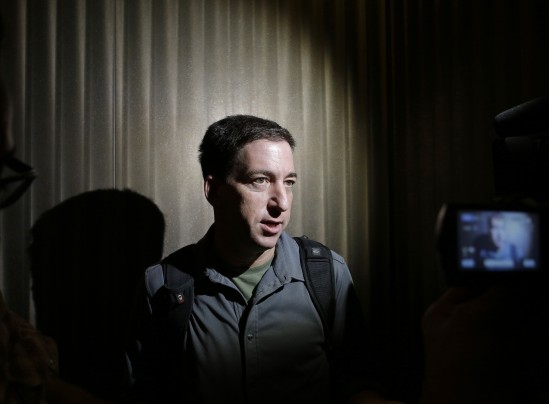By Paul Farhi
For a newspaper that’s small and underweight even by British standards, the Guardian has a knack for making some big noises, both in its home market and across the pond.
The venerable paper (founded in 1821) was one of five news organizations to publish stories based on WikiLeaks’s trove of leaked U.S. diplomatic cables in late 2010. The only American newspaper to publish the leaks, the New York Times, did so thanks to the generosity of the Guardian, which shared the documents.
Next, the Guardian’s revelations about the extent of illegal phone tapping by journalists at Rupert Murdoch’s News of the World in 2011 helped bring down the massively popular British tabloid and led to a wave of criminal prosecutions in Britain.
In late May, the Guardian was at it once more. The newspaper raced The Washington Post to break details of a massive National Security Agency surveillance program. It subsequently posted the first and only video interview with Edward Snowden, the young American security contractor who was the source of The Post’s and Guardian’s stories.
Not a bad run of scoops for a financially struggling, frankly liberal newspaper with a newsprint circulation of fewer than 160,000 copies daily (which makes it roughly the size of the Arkansas Democrat-Gazette) but with a significantly larger digital following worldwide.

The NSA stories, in particular, raised the Guardian’s profile to an Everest-like peak. Its video interview with Snowden, conducted by its star American columnist Glenn Greenwald, attracted nearly 7million unique views worldwide in one day. The total was a record for the paper’s Web site, which is already one of the world’s most heavily trafficked news sites with a high of 41 million unique monthly visitors.
The NSA and WikiLeaks revelations also raise a question: Why is a London-based news organization revealing so many secrets about the American government?
“We’re just doing what journalists do,” replies Alan Rusbridger, the Guardian’s longtime editor and architect of its global digital strategy. “We were contacted, just as The Washington Post was contacted, [by a source] with some very interesting documents. No journalist in the world wouldn’t have been interested in this.”
The Guardian, he points out, is equally dogged about domestic spying; it published revelations last month that the British equivalent of the NSA monitored the computers and phone calls of foreign officials during two G-20 summit meetings in London in 2009 – a story that embarrassed the British government on the eve of hosting another international summit.
Since 2008, the Guardian has been making a major push to appeal to the American market. After a bout of layoffs, it now employs 29 journalists in the United States, primarily in New York and Washington. Online visitors from the States are channeled to the Guardian’s U.S. edition, which features America-centric news. Monday’s page, for example, carried articles about the deaths of firefighters in Arizona and a retrospective of photos from the Battle of Gettysburg.
Along the way, the paper has hired a succession of American pundits such as Murdoch biographer Michael Wolff, NPR host Bob Garfield and former Wonkette blogger Ana Marie Cox.
Its biggest hire, arguably, has been Greenwald, the crusading columnist who broke (along with The Washington Post’s Barton Gellman) the NSA surveillance stories.
Greenwald joined the Guardian as a regular columnist and blogger last August. He said the decisive factor in his decision to leave Salon.com for the Guardian wasn’t money, but rather the newspaper’s approach to the powerful.
“For at least a couple of years before I went there, I found myself citing Guardian articles quite frequently in the work I was doing,” Greenwald said in an exchange of e-mails from Rio de Janeiro, where he resides with his Brazilian husband. “They were extensively covering vital stories that most U.S. media outlets were either ignoring or downplaying in areas of U.S. foreign policy, civil liberties, secrecy, whistleblowing and the like.”
In Greenwald’s view, American media outlets “tend to be far more reverent of and accommodating to political power than British media outlets, including the Guardian.”
Then again, the Guardian has its own sacred cows. Unlike its American media cousins, which have traditionally sought neutrality in their news reporting, the Guardian hews to the British model of identifying with a political party. The paper has been liberal since its founding by Manchester mill owners and cotton merchants; in the last British elections it supported the minority Liberal Democrats.
It has played politics here, too. In 2004, it enlisted its readers to write to undecided voters in Ohio, advising them to vote against President George W. Bush. The campaign elicited a thunderous rebuke from American and British readers alike and was scrapped.
Rusbridger explains that some of the Guardian’s willingness to experiment, and much of its independence, is a result of its unusual ownership structure. The newspaper has been owned for decades by a charitable foundation, the Scott Trust Limited, whose “core purpose” is to secure the paper’s editorial independence “in perpetuity.” The trust also owns a sister newspaper, the Observer. (On Sunday, the Observer posted and then quickly withdrew a story that alleged the United States had worked with European Union countries to collect personal communications data; the piece was based solely on information from Wayne Madsen, an American conspiracy theorist who has suggested that President Obama is gay.)
For all its nominal success abroad, the Guardian is troubled at home. Circulation of its domestic print edition has tumbled by more than half since the beginning of 2006; according to British media accounts, the paper lost about $1 million a week from 2009 to 2012. It continues to lose money, according to Rusbridger. “We’ve been through lean times like everyone else,” he says. “Last year wasn’t great.”
But he notes that the paper is subsidized by other ventures owned by the trust, including Auto Trader, a highly profitable British car-sales site.
Rusbridger isn’t blind to the irony. The next round of globe-rattling government-secrecy revelations, he says, may be brought to you by “a secondhand car magazine.
The AfricaPaper: Many thanks to Paul Farhi and The Washington Post for this report.










































